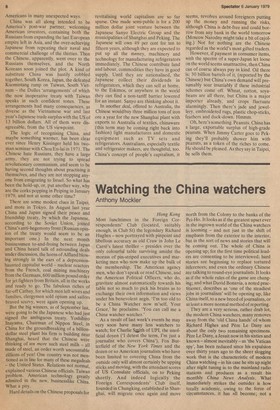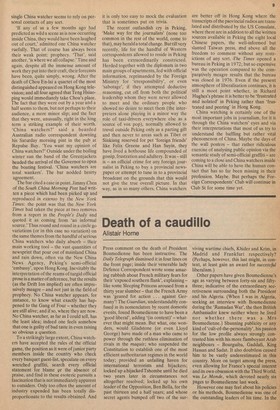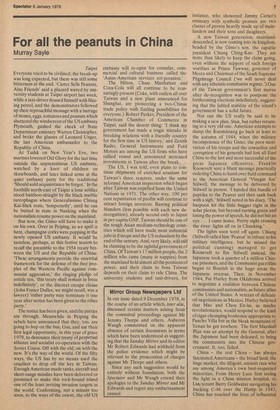Watching the China watchers
Anthony Mockler
Hong Kong Most lunchtimes in the Foreign Correspondents' Club (located, suitably enough, in Club St) the legendary Richard Hughes — now portrayed with pinpoint and libellous accuracy as old Craw in John Le Carre's latest thriller — presides over the only colourful table surviving amidst the morass of pin-striped executives and marketing men who now make up the bulk of the membership. The American agency men, who don't speak or read Chinese, and the American Political Officers, who do, gravitate almost automatically towards his table not so much to pick his brains as to exchange their own information and views under his benevolent aegis. 'I'm too old to be a China Watcher now m'self, Your Grace,' he proclaims. 'You can call me a China watcher watcher.'
As a result of last week's events he may very soon have many less watchers to watch; for Charlie Smith of UPI, the unofficial doyen (`I detest the term, I'm just a journalist who covers China), Fox Butterfield of the New York Times and the dozen or so American journalists who have been limited to covering China from the outside only will almost certainly be upping sticks and moving, with the attendant scores of US Consulate officials, on to Peking shortly. And indeed logically the Foreign Correspondents' Club itself, founded in Chungking, established in Shanghai, will migrate once again and move north from the Colony to the banks of the Pei-Ho. It looks as if the greatest upset ever in the ingrown world of the China watchers is looming — and not just in the shift of emphasis from the exterior to the interior, but in the sort of news and stories that will be coming out. The whole of China is opening up; for the first time political leaders are consenting to be interviewed; hard stories are beginning to replace tortured inferences; and even the ordinary Chinese are talking to round-eye journalists. It looks as if the whole rules of the game are changing; and what David Bonavia, a noted practitioner, describes as 'one of the steadiest jobs in journalism' will be opening up, like China itself, to a new breed of journalists, or at least a more normal method of reporting.
They are a very serious, rather drab lot, the modern China watchers, many removes away from the 'old China hands' of whom Richard Highes and Pere Le Dany are about the only two remaining specimens. Pere Le Dany, a Jesuit now in his sixties and known — almost inevitably — as 'the Vatican spy', has been reduced since his expulsion over thirty years ago to the sheer slogging work that is the characteristic of modern China watching — in his case he sits up night after night tuning in to the mainland radio stations and produces as a result his monthly China News Analysis. What immediately strikes the outsider is how totally academic, owing to the force of circumstances, it has all become; not a single China watcher seems to rely on personal contacts of any sort.
'If any of us a few months ago had predicted as wild a scene as is now occurring inside China, they would have been laughed out of court,' admitted one China watcher ruefully. That of course has always been their weak point: prophecy. 'That', said another, 'is where we all collapse.' Time and again, despite all the immense amount of work they put into their craft, their forecasts have been, quite simply, wrong. After the death of Chou En-lai a quartet of the most distinguished appeared on Hong Kong television; and all four agreed that Teng Hsiaoping would immediately take Chou's place. The fact that they were out by a year and a half seems to them, but not perhaps to their audience, a mere minor slip; and the fact that they were, unusually, right in the long term a striking example of their worth. 'China watchers?' said a bearded Australian radio correspondent downing his Saturday morning pint in the pub at Repulse Bay. 'You want my opinion of China watchers?' Outside under the boiling winter sun the band of the Greenjackets headed the arrival of the Governor to open the boating festival. 'China watchers are total wankers'. The bar nodded hearty agreement.
The bar cited a case in point. Jimmy Chen of the South China Morning Post had written a piece which had been picked up and reproduced in extenso by the New York Times: the point was that the New York Times had taken the piece at two removes from a report in the People's Daily and quoted it as coming from 'an informal source.' Thus round and round in a circle go variations (or in this case no variation) on the same themes from the handful of serious China watchers who daily absorb — their main working tool — the vast quantities of newsprint that pour out of mainland China and rain down, often via the New China News Agency, Peking's semi-official 'embassy', upon Hong Kong. Inevitably the interpretation of the reams of turgid official prose is a matter of inference, but the results (as the Drift Inn implied) are often impressively meagre — and not just in the field of prophecy. No China watcher appears, for instance, to know what exactly has happened to the Gang of Four — whether they are still alive; and if so, where they are now. No China watcher, as far as I could tell, has the least idea; indeed one feels somehow that one is guilty of bad taste in even raising so obvious a question.
To a strikingly large extent, China watchers have accepted the rules of the official game, the position as it were of junior party members inside the country who check every banquet guest-list, speculate on every wretched graffiti, search every official statement for blame pr the absence of praise, and find in these esoteric pursuits a fascination that is not immediately apparent to outsiders. Only too often the amount of industry expended has been totally disproportionate to the results obtained. And it is only too easy to mock the evaluation that is sometimes put on trivia.
The recent outlandish cry in Peking, 'Make way for the journalists' (none too common in the rest of the world, come to that), may herald a total change. But till very recently, life for the handful of Western correspondents allowed to reside in Peking has been extraordinarily constricted. Herded together with the diplomats in two main groups of apartments, fed with official information, reprimanded by the Foreign Ministry for 'irresponsibility', or even 'sabotage', if they attempted deductive reasoning, cut off from both the political leadership whom they were never allowed to meet and the ordinary people who showed no desire to meet them (the interpreters alone playing in a minor way the role of taxi-drivers everywhere else as a source of vox pop), normally allowed to travel outside Peking only as a parting gift and then never to areas such as Tibet or • Sinkiang reserved for pet 'foreign friends' like Felix Greene and Han Suyin, they have lived a hothouse life compounded of gossip, frustration and adultery. It was— still is — an official crime for any foreign journalist in Peking to buy a provincial newspaper or attempt to tune in to a provincial broadcast on the grounds that this would not give the true overall picture. In that way, as in so many others, China watchers are better off in Hong Kong where the transcripts of the pmvincial radios are translated and distributed by the US Consulate, where there are in addition to all the written sources available in Peking the eight local Chinese papers, the well-informed but slanted Taiwan press, and above all the freedom to comment without any restrictions of any sort. -The Times opened a bureau in Peking in 1972; but so expensive was the operation compared to the comparatively meagre results that the bureau was closed in 1976. Even if the present atmosphere of liberalisation continues, it is still a moot point whether, in Richard Hughes's phrase it is better to be 'frustrated and isolated' in Peking rather than 'frustrated and peering' in Hong Kong.
China watching is certainly one of the most important jobs in journalism, for it is through the China watchers' eyes and via their interpretations that most of us try to understand the baffling but rather vital phenomenon of China. Maybe the days of the wall posters — that rather ridiculous exercise of analysing public opinion via the semantic study of semi-official graffiti — are coming to a close and China watchers inside China will be able to have the human contact that has so far been missing in their profession. Maybe. But perhaps the Foreign Correspondents' Club will continue in Club St for some time yet.
Mirror Group Newspapers Ltd In our issue dated 9 December 1978, in the course of an article which, inter alia, discussed certain matters arising from ' the committal proceedings against Mr Jeremy Thorpe and others, Auberon Waugh commented on the apparent absence of certain documents in terms which have been understood as suggesting that the Sunday Mirror and its editor Mr Robert Edwards had withheld from the police evidence which might be relevant to the prosecution of charges against Mr Thorpe and others.
Since any such suggestion would be entirely without foundation, both the Spectator and Mr Waugh extend their apologies to the Sunday Mirror and Mr Edwards and regret any embarrassment caused.
































 Previous page
Previous page